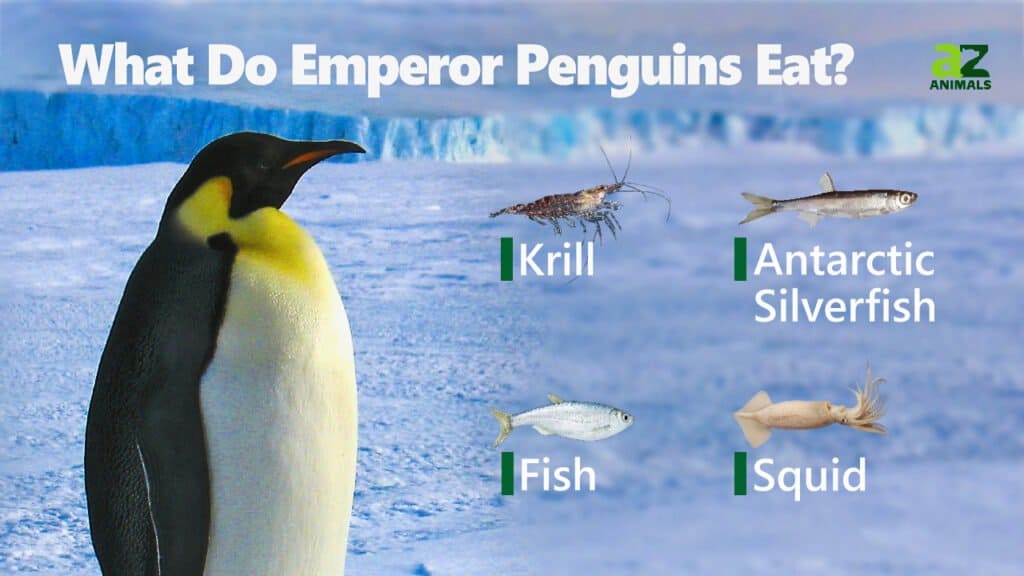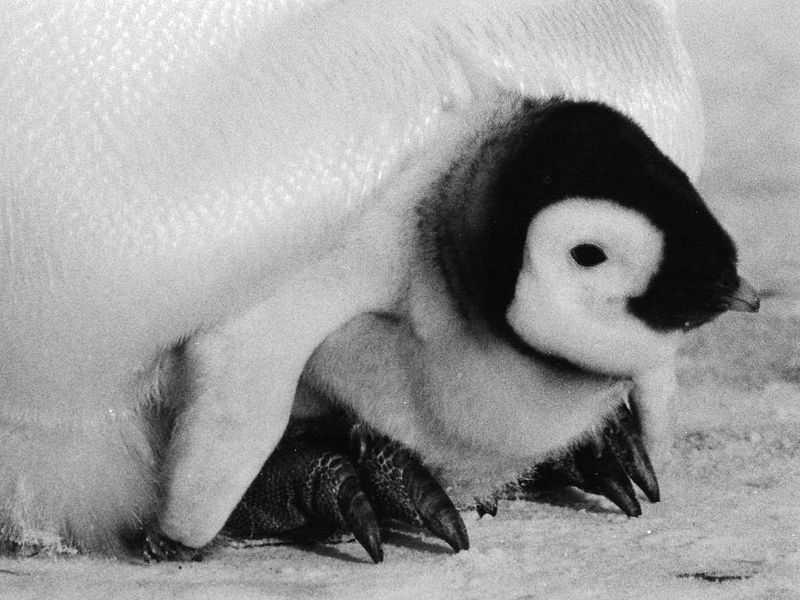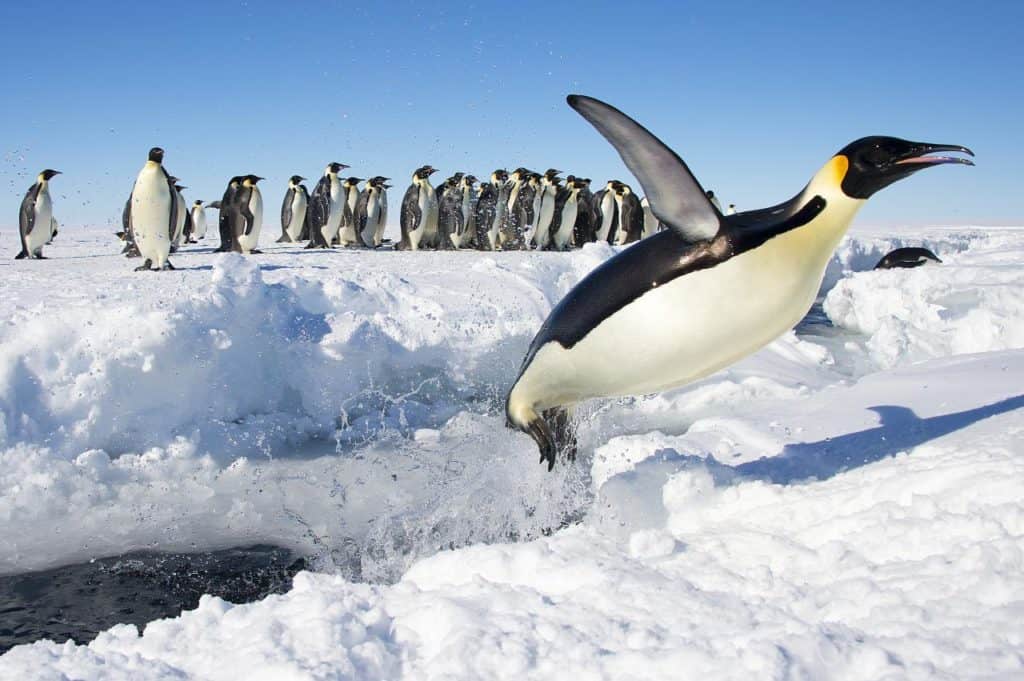Emperor penguins (Aptenodytes forsteri) are notable for a simple reason: they’re the largest penguin species alive today! Found only in Antarctica with an average height of 45 inches, these massive penguins can weigh up to 88 pounds (40 kg). Penguins have flippers instead of wings, and their bodies are streamlined for swimming.
Furthermore, emperor penguins possess large heads, short necks, and elongated bodies. Their feathers are counter-shaded with a black body and white belly. The unique features of Emperor penguins and their habitat makes people curious about how they survive, particularly what they eat. Here we’ll dive deep into what emperor penguins eat, how they hunt, and more!
What Do Emperor Penguins Eat?

Being predominantly carnivores, emperor penguins eat a diet that consists of krill (a shrimp-like crustacean), squids, silverfish, and other fish species. Unlike many penguins that feed on the surface prey, Emperor penguins often reach depths of over 1500 feet and can remain submerged for as long as 18 minutes.
Emperor penguins don’t eat any aquatic or terrestrial plants across their paths due to their body system and requirements. They need to store enough fat for breeding as they do not eat during that period. A study of their diet in the journal Antarctic Science discovered that 78% of their diet by mass was fish. The ideal length for fish catches is about 1.5 to 5 inches in length. By far, their most popular prey is the Antarctic silverfish, which in some populations can be 89% of their fish prey. Depending on the season, crustaceans can be up to 10% of an emperor penguin’s prey while squid is an even smaller percentage.
Here is a list of foods emperor penguins eat;
What Do Chicks Eat?

Emperor Penguin Chicks eat regurgitated food provided by their parents
©Mtpaley / CC BY 2.5, from Wikimedia Commons, the free media repository – License
Chicks are young penguins who are always cared for by their parents. At this stage, they can’t search for their food by themselves, and they have to depend directly on their parents for both food and warmth.
Baby Emperor penguins eat and live on a diet of regurgitated food provided by their parents. In other words, Emperor penguins chew the food first before feeding it to their babies from their mouths. Males and females take turns feeding the chicks.
The male emperor penguin, despite his fasting during the incubation period, secretes a curd-like substance from his esophagus and feeds the chick if the female is yet to return when the egg hatches.
How Do Emperor Penguins Hunt?
Emperor penguins chase after fish and other marine animals in the open seas or break in the ice. They dive very deep to catch their prey, and these depths vary seasonally and periodically.
Emperor penguins depend on their great vision while hunting. Also, the bioluminescence nature of many oceanic fishes and crustaceans helps penguins see their foods. Furthermore, Emperor penguins have beaks structured to catch fish, streamlined bodies for fast and easy swimming, strong jaws, and spiny tongues to hold onto slippery prey.
In addition, Emperor penguins have developed solid bones, unlike the hollow bones most birds have. This enables them to withstand ocean waves in the depth of rivers when they hunt for fish and other aquatic life.
Emperor penguins walk, swim, and sled from their colonies to feeding grounds. Periods when seas to fish are so far away, they get their food from seal openings and other cracks in the ice. Studies have demonstrated that the diet of emperor penguin chicks are higher in both crustaceans and squid, which may demonstrate that parents change their hunting strategies when raising chicks.
How Is Stone Swallowing Important To Emperor Penguins’ Diet?
Emperor penguins are found to have a considerable amount of stones in their stomachs. They swallow these stones consciously or unconsciously, which helps them in a few ways.
- These stones are speculated to reduce buoyancy while diving and reduce hunger during their fasting period.
- The stones also aid the digestion of ingested food, especially the tough exoskeletons of crustaceans (a vital part of their diet). It increases the surface area of the food to enable digestive enzymes to act on them.
How Much Do Emperor Penguins Need To Eat?
A grown-up emperor penguin can eat up to 4-6 lb consistently daily. Assuming they need to fill up before shedding or toward the start of the breeding season, emperor penguins could eat food that weighs up to 13 lb each day.
Breeding Emperor penguins must be well fed before returning to their colony from their hunting grounds. This is necessary as the chicks depend directly on the food brought back.
How Emperor Penguins Eat And Survive During Winter
Unlike many other penguins that move to the north away from the infringing winter, Emperor penguins move to the south where the weather is harsh. This is the period that they breed. The females lay eggs and wander off back into the sea to hunt for food, leaving the egg in the care of the males to incubate.
The male Emperor penguin places the egg on his feet and stays in flat areas of the sea ice surrounded by icebergs to protect against winds.
These male Emperor penguins don’t eat until the chick is hatched and the female parent returns to relieve him, which takes up to 120 days. This time they use their stored body fat as a source of energy, and they also sleep a lot (about 20 hours daily) to reduce metabolism.
Emperor penguins survive by huddling together to derive warmth. They take turns with exposure to the cold and winds. The cold ones on the outside move inwards, and a warmer Emperor penguin is exposed. This enables them to manage the combined cold environment, fasting, and strong wind.
What Are Emperor Penguins’ Predators?
In the wild, Emperor penguin predators are Antarctic giant petrels (Macronectes giganteus), skua, killer whales (orca), Leopard seals, and sharks. Deserted sled dogs previously went after penguins before the expulsion of dogs from Antarctica.
Can Emperor Penguins Harm Humans?
It has to be mentioned that the possibility of humans and emperor penguins being in contact with one another is negligible. Except if you are exploring a few remote parts of the planet where they reside, or you work at a Zoo with penguins, you won’t see one.
As a result, penguins are not directly dangerous to humans, unlike many animals (such as lions, foxes, and tigers) that will attack you if you come too close to them.
Regardless, Emperor penguins may show resistance when you seem to pose a threat to their chicks but won’t in any way dangerously attack you.
Is It Ideal To Feed Emperor Penguins In The Wild?

Emperor Penguins eat between 4-6 lb of food daily
©Christopher Michel / CC BY 2.0, Flickr – License
It is not a usual event to run into an Emperor penguin. However, if you happen to visit Antarctica and with the opportunity to see a huddle, it is advised you don’t move too close to them, let alone feed them. This is essential because of the reasons below.
- You don’t want to distract a parent penguin as predators often feed on the chicks.
- If you contact them or feed them, you may make them unhealthy by infecting them or providing them food that is not ideal for them.
The photo featured at the top of this post is © iStock.com/BernardBreton
Thank you for reading! Have some feedback for us? Contact the AZ Animals editorial team.







